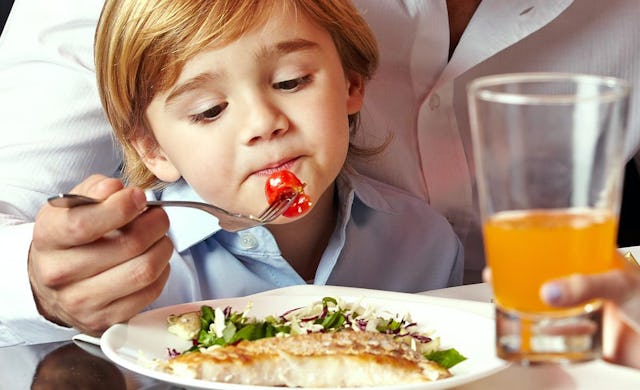Another Reason To Drop The Guilt About Your Picky Eater

Can you list on one hand the foods your child will eat? Is dinner a rotation of the same three or four meals? Sure, your kid is a picky eater, but what you might not know is that “selective eating” is linked to anxiety, depression and ADHD, according to a study in Pediatrics and reported by the New York Times.
This stands to reason. Children who have anxiety may be ultra-cautious about trying new things—any things, like new playground equipment or talking to new kids or starting with a new teacher. Food would be just one aspect of that reluctance to try new things. The researchers also point out that picky eaters may just be more sensitive: “‘Their sensory experience is more intense in the areas of taste, texture and visual cues. And their internal experience may be more intense, so they have stronger feelings,’ said Dr. [Nancy] Zucker,” the lead author of the study.
So while a typical eater might crunch through a stalk of celery or bite into a beet and not think too much of it, the picky eater may be so bothered by unfamiliar textures that they’ll steer clear of anything that could be at all unpleasant.
I read this, and I thought, “this explains a lot.” I have a problem with anxiety, and my own palate is oriented toward meat, pasta, bread and dairy products—things that have a predictable taste and put me into a soothing food coma. Fruits and vegetables, though there are a bunch I like, are trickier. Peaches in July? Delish. But supermarket strawberries in January, which my husband gobbles down? Way too sour, and not at all a pleasant experience for me. Tomatoes? Fine in the summer, but the rest of the year, blech. Bok choy is too bitter. Broccoli, unless it’s roasted, is either too crunchy or too limp.
For a long time, I thought this was due to how I’ve been raised—a traditional American meat-and-starch diet—but perhaps it’s due to the sourness of the strawberries or the texture of the broccoli. Those foods just don’t give me the same comforting dopamine rush that I get from a grilled cheese sandwich and a bowl of tomato soup.
I don’t think my sons suffer from anxiety—they seem pretty well-adjusted, social little guys. But they like their grilled cheese and tomato soup as much as I do, and getting them to try new foods has been an ongoing challenge. They are definitely more selective when it comes to fruits and vegetables, and I’ve been feeling pretty guilty about my own failures to “get them to like” greens and fruit.
We’ve been following Ellyn Satter’s division of responsibility, which can be summed up thusly: I decide what’s for dinner, and the kids decide, from what’s on their plates, what they’re going to eat and how much. There’s no cajoling or pressure or negotiation.
It’s worked pretty well for us, but it’s hard to get around the fact that they vastly prefer carbs and meat to fruits and veggies. This new study is reassuring in that it makes me feel like a little less of a failure: I spend a lot of time wondering if maybe I tried a little harder to create delicious vegetable-based meals, my boys would be gobbling up Swiss chard and sautéed zucchini. But whether they have anxiety or ADHD or not, some people just don’t like those flavors, and it’s not because they haven’t been exposed to them enough (or because they’re somehow pulling a power play at the table). I can lose some of the guilt, on that front at least.
And it is also a wake-up call that no aspect of parenting happens in isolation: “It is a reminder that food is not a stand-alone issue and that it plays a role in the big picture of development,” the Times quoted Dr. Laura Jana, a pediatrician, as saying. Raising children is all big-picture stuff, not the small battles over how many bites of carrots your kid has eaten. You want your kid to grow up reasonably well-nourished, with at least some cooking skills, and an appreciation for as broad a variety of foods as you can manage. That doesn’t happen in the space of a meal or two—it takes years, even decades.
In the meantime, Dr. Jana also recommends “the division of responsibility” for meals. And she emphasizes, as well, that dinners should be more about family and less about food. We should be teaching our kids to enjoy the company as much as they enjoy their meals. And drop the guilt, even if it’s the third grilled cheese this week.
This article was originally published on